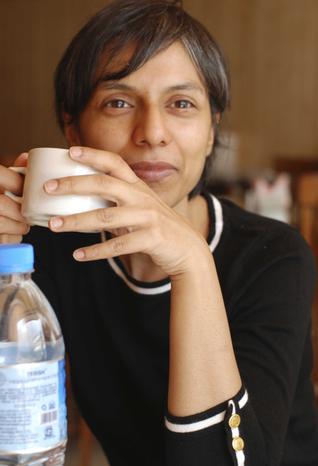Seriously, Sitara? is a tale of an unlikely romance between a Bollywood star and an art editor.
Sitara, a 30-year-old high-headed arts editor of a magazine is thrown off balance when asked to interview the dashing, reclusive actor Nasser Khan. She hopes it will be a one-off interview and she’ll have nothing to do with showbiz-types again. But fate has other plans.
From being boringly single, Sitara suddenly has two suitors set up by parents and a Bollywood Khan vying for her attention.
Nishat Fatima, the Hyderabad-bred and now Delhi-based author’s debut novella, Seriously, Sitara? (Hachette India; Rs. 299) is a witty story of relationships told through a series of unbelievable yet interesting incidents. A self-confessed reader of romances by Jennifer Crusie, Georgette Heyer, Jane Austen, the early Nora Roberts, Susan Napier and Jayne Ann Krentz, Nishat says her first book had to be a romance. Excerpts from an interview with Nishat, who now serves as editor, Harper’s Bazaar :
There have been quite a few books by Indian authors exploring the lives of single women in a big city. Were you conscious of this while writing Seriously, Sitara? There’s a hint of Bridget Jones’ quality to Sitara…
I think it’s simply that stories in India have moved to an urban setting, which basically means that if your protagonist is female and single you can categorise it as single woman in the city. I was clear from the start that I was writing a rom-com. However, if you consider chick lit, there is often the device of making your heroine a little bit clumsy, and I plead guilty to that.
Sitara is a feisty, intelligent journalist who doesn’t get swayed by the glamour of the Hindi film industry and gives the poster-boy Nasser Khan a drubbing. How did you go about shaping up Sitara’s character traits?
I’d started out basing Sitara on a couple of friends from college. But by chapter three, Sitara started to do her own thing, then by the time we came to the last draft, she was her own person. (Clichéd, but true.)
You narrate the insecurities and fickle relationships of the film industry like an insider. How much of it was from your experience of interviewing film personalities?
Well, I’ve spent a lot of time waiting for actors to give me interviews! But I have to admit that thestarting point about the insecurities of actors came from a magazine article written by an actor (anonymously) about why he stopped dating plastic perfection.
That set me thinking about actors and what they must go through. I also watched a couple of movies, though didn’t manage to crack open the box set of Entourage. When I was interviewing actors I was far too concerned about making deadlines to think about anything except how soon they would give me an interview.
Nasser Khan, as you’ve portrayed him, wants to stay closer to real people. The wily, back-biting ways of the film industry are not for him. Did you want Nasser to be this way so that it makes it easier for him to be drawn to someone like Sitara?
I have to admit that Sitara had very little to do with Nasser’s character. It was all his mother’s doing. As soon as she appeared, I fell in love with her, and figured her son would be a little different.
How long did it take you to write this story?
Four years, five drafts, and many, many cups of adrak chai .
You’ve written considerably on fashion and specialised in photography; so a romance with Bollywood comes as a surprise. Was this story the first story you wanted to write?
It was. I have read so many romances over the years that there was no doubt at all that my first book would be one. However, my coffee table book on 25 years of Suneet Varma did come out earlier this year, so my fashion leanings have been served too.
What’s next?
I’m kicking around a couple of ideas. Right now, though I’m just enjoying the coming out of ‘Seriously, Sitara?’
source: http://www.thehindu.com / The Hindu / Home> National / by Sangeetha Devi Dundoo / June 22nd, 2013









